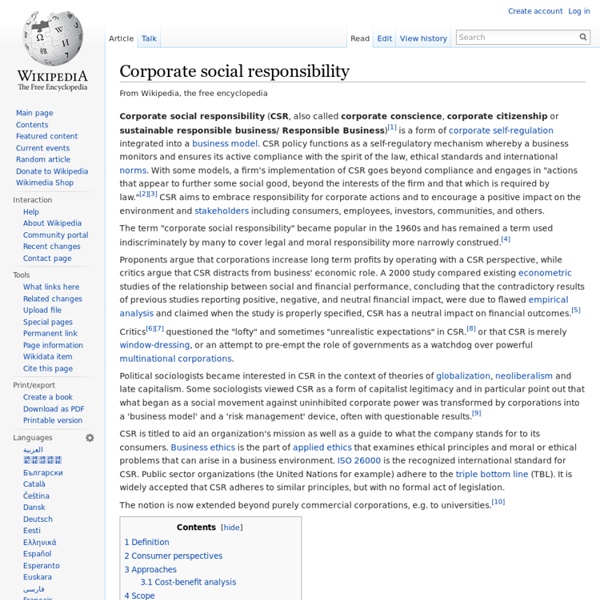Corporate social responsibility

Conseil national des Chambres Régionales de l'Économie Sociale
Missions | Services | Saisine | Réseau des Observatoires Régionaux Porté par le CNCRES, l’Observatoire national de l’Economie Sociale et Solidaire est le lieu de convergence de la mesure et de l’observation de l’économie sociale et solidaire. Il permet d'établir des liens entre les acteurs de l'ESS, pouvoirs publics, producteurs d’études et universitaires autour de travaux sur l’économie sociale et solidaire. L'Observatoire national s'appuie sur le réseau de compétences des Observatoires régionaux de l'ESS pour conduire une méthodologie homogène, scientifique et cohérente entre les territoires, afin d’assurer leurs fonctions d’étude, de veille, d’aide à la décision et de prospective. Il a notamment participé, en collaboration avec l'INSEE et la DIIESES, à la définition du périmètre de l'ESS en 2007, permettant ainsi d'analyser l'évolution d'un champ particulièrement dynamique et innovant. Les missions de l’Observatoire L’offre de services Saisine de l’Observatoire Ses publications
L'entrepreneuriat social : une force de transformation de l'économie
Une tribune signée Amandine Barthélémy et Romain Slitine, Co-fondateurs de ODYSSEM, collectif d’acteurs au service du développement de l’innovation sociale, experts-associés à l’ESSEC IIES (Institut de l’innovation et de l’entrepreneuriat social Entrepreneuriat social Définition) et maîtres de conférence à Sciences Po Paris et Sciences Po Lille. L’entrepreneuriat social Entrepreneuriat social Définition est d’ores et déjà une dynamique qui a fait ses preuves, par des innovations concrètes toujours plus nombreuses qui inspirent utilement de plus en plus d’acteurs de l’économie. Contre la morosité des idées reçues de la théorie économique dominante, l’entrepreneuriat social propose des pistes très sérieuses qui changent les pratiques et… la façon de faire l’économie ! Dans une France qui déprime, c’est la preuve que les personnes peuvent être des acteurs de changement et que l’on peut favoriser d’autres méthodes de gestion et de décision qui sous-tendent la vie des entreprises.
Petites entreprises et territoires, oubliés de la réforme bancaire
Les très petites entreprises (TPE) de moins de 10 salariés représentent 23 % des emplois marchands et leur production représente 22 % de la valeur ajoutée imposable en France. En outre, leur dispersion sur le territoire fournit la maille et le support des liens sociaux qui "font société" et elles fertilisent le terreau (culture entrepreneuriale, compétences, sous-traitance) dont les autres entreprises ont besoin pour se développer. L’ancrage dans les territoires d’un tissu de petites entreprises constitue ainsi le socle indispensable de la stratégie de croissance que le gouvernement veut impulser avec la réforme bancaire dont le Parlement est saisi. Et pourtant il n’y a rien, ni sur les économies territoriales ni sur les TPE, dans ce projet de loi ! A l’évidence, ces besoins sont réels. Et que dire des nombreuses petites entreprises qui ne voient pas le jour car ceux qui en portent le projet ne peuvent accéder au crédit bancaire, voire n’osent pas le solliciter.
ESS
Le terme d’Economie sociale et solidaire regroupe un ensemble de structures qui reposent sur des valeurs et des principes communs : utilité sociale, coopération, ancrage local adapté aux nécessités de chaque territoire et de ses habitants. Leurs activités ne visent pas l’enrichissement personnel mais le partage et la solidarité pour une économie respectueuse de l’homme et de son environnement. Le modèle économique de l’ESS est au service de la société et du citoyen. L’Economie sociale et solidaire naît de la synthèse de deux concepts L’économie sociale se définit par les statuts des structures qui la composent : associations, coopératives, mutuelles et fondations. L’économie solidaire rassemble les organisations dont l’objectif premier est l’utilité sociale. Ces deux mouvements sont complémentaires, l’économie solidaire a revitalisé les valeurs défendues par l’économie sociale : une économie au service de l’homme et non au service du profit.
Related:
Related:



